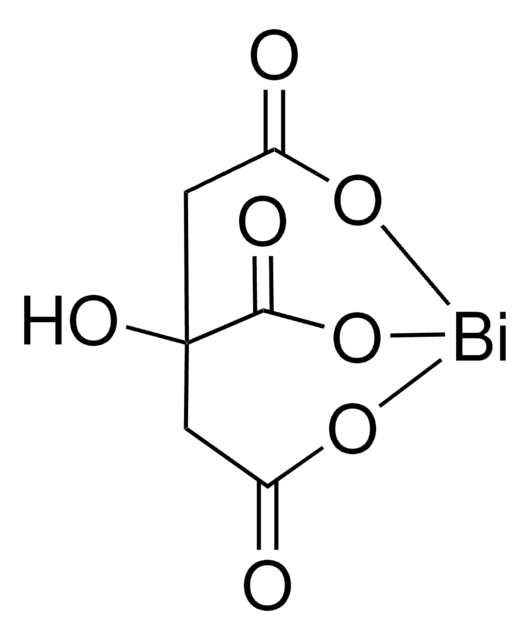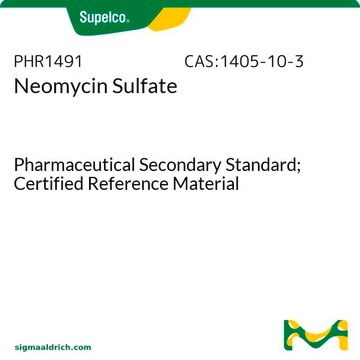Alle Fotos(3)
Wichtige Dokumente
480789
Bismut(III)-subsalicylat
99.9% trace metals basis
Synonym(e):
Bismut(III)salicylat basisch
Anmeldenzur Ansicht organisationsspezifischer und vertraglich vereinbarter Preise
Alle Fotos(3)
About This Item
Lineare Formel:
HOC6H4COOBiO
CAS-Nummer:
Molekulargewicht:
362.09
EG-Nummer:
MDL-Nummer:
UNSPSC-Code:
12161600
PubChem Substanz-ID:
NACRES:
NA.22
Empfohlene Produkte
Qualitätsniveau
Assay
99.9% trace metals basis
Eignung der Reaktion
core: bismuth
reagent type: catalyst
mp (Schmelzpunkt)
>350 °C (lit.)
SMILES String
O[Bi]1OC(=O)c2ccccc2O1
InChI
1S/C7H6O3.Bi.H2O/c8-6-4-2-1-3-5(6)7(9)10;;/h1-4,8H,(H,9,10);;1H2/q;+3;/p-3
InChIKey
ZREIPSZUJIFJNP-UHFFFAOYSA-K
Allgemeine Beschreibung
Bismuth(III) subsalicylate (BSS) is mainly used in bismuth-based medicines for treating gastrointestinal disorders and diarrhea.
Anwendung
- Use of ferric chloride to identify salicylate-containing poisons.: This study explores the use of ferric chloride to detect salicylate compounds, including Bismuth subsalicylate, highlighting its significance in toxicological screenings and emergency treatments. (Hoffman RJ et al., 2002).
- Effect of pepper and bismuth subsalicylate on gastric pain and surface hydrophobicity in the rat.: Investigates the effects of Bismuth subsalicylate on gastric pain and stomach lining properties, providing insights into its gastroprotective mechanisms. (Lichtenberger LM et al., 1998).
- The coccoid forms of Helicobacter pylori. Criteria for their viability.: Examines the effectiveness of Bismuth subsalicylate in targeting different morphological forms of Helicobacter pylori, contributing to its role in eradication therapies. (Bode G et al., 1993).
- Bismuth therapy in gastrointestinal diseases.: A comprehensive review of the therapeutic applications of Bismuth subsalicylate in treating various gastrointestinal disorders, underscoring its pharmacological benefits and safety profile. (Gorbach SL, 1990).
Lagerklassenschlüssel
11 - Combustible Solids
WGK
WGK 3
Flammpunkt (°F)
Not applicable
Flammpunkt (°C)
Not applicable
Persönliche Schutzausrüstung
Eyeshields, Gloves, type N95 (US)
Hier finden Sie alle aktuellen Versionen:
Besitzen Sie dieses Produkt bereits?
In der Dokumentenbibliothek finden Sie die Dokumentation zu den Produkten, die Sie kürzlich erworben haben.
Kunden haben sich ebenfalls angesehen
M D Manhart
Reviews of infectious diseases, 12 Suppl 1, S11-S15 (1990-01-01)
This report demonstrates that bismuth subsalicylate (BSS) effectively inhibits growth of a number of bacterial strains known to cause diarrhea, including Escherichia coli, Salmonella, Shigella, and Campylobacter. Other bismuth salts and sodium salicylate, a hydrolysis product of BSS in the
Copolymerizations of e-Caprolactone and Glycolide A Comparison of Tin (II) Octanoate and Bismuth (III) Subsalicylate as Initiators.
Kricheldorf HR and Rost S.
Biomolecules, 6(3), 1345-1352 (2005)
D W Bierer
Reviews of infectious diseases, 12 Suppl 1, S3-S8 (1990-01-01)
Pepto-Bismol, which contains bismuth subsalicylate (BSS) as the active ingredient, has been marketed in the United States for more than 80 years. In the gastrointestinal tract, BSS is converted to salicylic acid and insoluble bismuth salts. The salicylate portion of
N Chande et al.
The Cochrane database of systematic reviews, (2)(2), CD006096-CD006096 (2008-04-22)
Lymphocytic colitis is a cause of chronic diarrhea. Therapy is based mainly on case series and uncontrolled trials, or by extrapolation of data for treating collagenous colitis, a related disorder. This review was performed to identify therapies for lymphocytic colitis
Peter Bytzer et al.
Danish medical bulletin, 58(4), C4271-C4271 (2011-04-07)
National Danish guidelines for the diagnosis and treatment of Helicobacter pylori (Hp) infection have been approved by the Danish Society for Gastroenterology. All patients with peptic ulcer disease, gastric cancer, and MALT lymphoma should be tested for Hp. We also
Unser Team von Wissenschaftlern verfügt über Erfahrung in allen Forschungsbereichen einschließlich Life Science, Materialwissenschaften, chemischer Synthese, Chromatographie, Analytik und vielen mehr..
Setzen Sie sich mit dem technischen Dienst in Verbindung.










